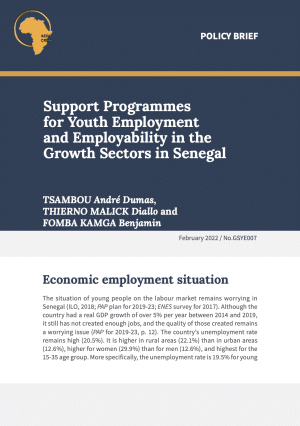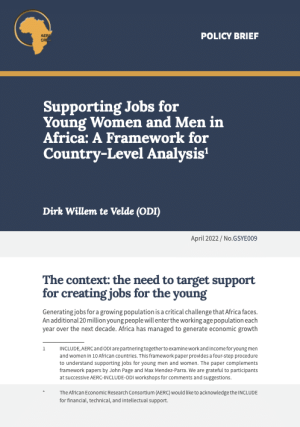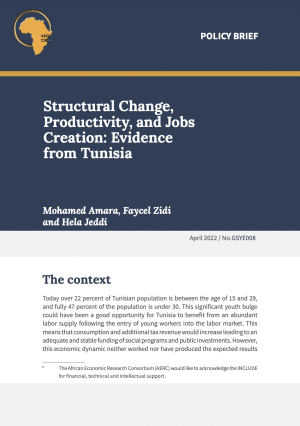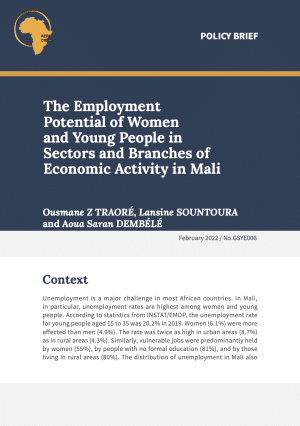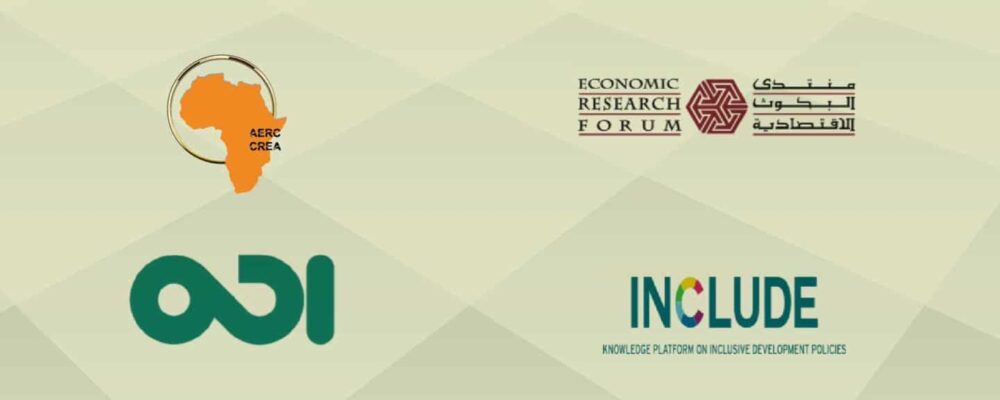
The AERC hosted a virtual Regional Policy Forum on 28 March 2022. The forum brought together key stakeholders who play important roles in shaping new research findings, paving new policy directions, and initiating innovative practices in the areas of youth and employment. The RPF was attended by about 100 participants from Belgium, Benin, Botswana, Cameroon, Cote’ d’Ivoire, Egypt, Eswatini, France, Gambia, Guinea, Kenya, Netherlands, Nigeria, Sierra Leone, Togo, Tunisia, Uganda, United Kingdom, United States, Zambia and Zimbabwe. They deliberated on the key findings from the papers and implications of this for policymaking in Africa. The regional policy forum featured new findings on (a) employment sectors with the highest multipliers and potential to provide employment opportunities for Africa’s youth (b) ways to promote equal access to these opportunities by all youth regardless of their gender, socio-economic background, or geographical location, and (c) conditions needed to support these sectors.
The Objectives of the Regional Policy Forum were to:
- Provide insight on promising economic sectors or value chains for job creation for young men and women in selected countries in Africa.
- Provide policy actors with a platform to discuss the identified economic sectors for job creation in Africa and how both local and foreign investors can invest in these sectors or value chains,
- Generate innovative ideas and progressive partnerships to promote equal access and opportunity for youth to these new sources of work and income, addressing inequality related to gender, socio-economic background, and place of residence.
The keynote address was given by Ms Cynthia Samuel-Olonjuwon, ILO Assistant Director-General, Regional Director for Africa, who noted that the young men and women in Africa should be targeted because (1) the African labour force is young and growing rapidly with the works force comprising over 34 % of the working-age population. Africa is the only region where the youth labour force is expanding (2) working poverty among young people is higher in Africa than elsewhere (3) Over 40 % of young Africans work in informal employment and agriculture remains the source of employment. (4) 1 in 5 of all young people in Africa have neither a job nor have participated in educational training. The keynote speaker noted that there is need for partnerships to take urgent and concrete action to improve the lives of young people, enhance informal economy and social protections and support young men and women in their search for decent jobs. She summed up her speech by noting that several policy actions will be required to support work and incomes for young men and women which include (1) Economic growth and decent jobs for all (2) Educational training to be a core part of development policy and (3) Harness the benefits of the digital economy.
The RPF had both presentations and a High Policy round table. Four synthesis papers chaired by Prof. Margaret Chitiga, the dean of the faculty of Economic and management sciences at the University of Pretoria were presented during the forum. These include:
- Identifying economic sectors and activities for job creation in Africa: Which approach? Rolph van der Hoeven, International Institute of Social Studies
- Potential Sectors for greater Employment Generation in the MENA REGION: The case of Tunisia and Egypt; Prof. Chahir Zaki, Cairo University and Economic Research Forum
- Work and Income for Young Men and Women in Africa: Similarities and differences in the Potential employment Sectors and Subsectors in African Economies; John Mutenyo, Makerere University
- Growth sectors youth and employment: Challenges and way forward; Jacob Omolo, Kenyatta University
The High Policy round table was chaired by Professor Aly Mbaye, vice-chancellor of University Cheikh Anta DIOP (UCAD) in Dakar; Mr Jealous Chirove-Employment Specialist, ILO Dar Es Salaam office; Prof. Jane Mariara, Executive Director, Partnership for Economic Policy; and Prof. Damien Agbodji, Professor at the University of Lomé as distinguished panelists.
Outcomes of the Regional Policy Forum
Key Sectors
- Youth are concentrated in agriculture, service (trade) and industry (manufacturing). However, they are concentrated in undesirable jobs.
- Agricultural sector: There is a lot of marginalization of youth and women in the high agricultural value chain: e.g., exports, and cash crops. Youth and women have menial jobs in these sectors. Youth would be interested in jobs where there is value addition, agro-processing: horticulture, food dairy processing but due to lack of capital, they are concentrated in the low agricultural value chain.
- Service sector: Youth mostly concentrated in retail because they do not have enough capital.
- Transport sector: Most youths are drivers. For instance, in Uber, motorcycles, matatu industry and tracks drivers.
- Industry: Light manufacturing due to lack of capital.
- The ICT sector has not come out prominently in the studies and is becoming increasingly important for the youth. For example, software development, data mining, and online development. Youth can earn a lot of money but are constrained by capital.
- Most employment is created by the private sector, yet in East Africa, most employment created is by the informal sector
Key issues constraining access to employment opportunities by the youth and women.
- Supply-side constraints: Lack of good training. A mismatch between supply and demand as regards workers’ profile and skills. The majority of the unemployed youth and women live in rural areas. This population need jobs, yet they lack skills and education.
- Demand-side constraints: Business environment and necessity to make economy work to absorb the high number of unemployed people.
- Lack of enabling environment and policies conducive to job creation.
- Policies that do not consider the issues of women and youth
- Lack of integrated policy framework.
What policies should be put in place to improve employment quality in Africa?
- Improve productivity in areas where the majority of people are. That is, Agricultural sector Vs. Rural areas: This can be done by introducing appropriate technology and facilitating access to high yield fertilizers
- Have government policy and appropriate investment in the potential sectors. Thus, we need a deliberate policy and holistic programme that focuses on the potential sectors
- Provide avenues for youth to work while studying: Studies show that youth who have been working while studying are likely to be matched with jobs than those who do not work. If this is done, the duration of staying without a job will be reduced
- Policies that promote youth employment should include access to formal and informal credits. Credit access is important for women owned enterprises
- Targeted policies: Promote investment in priority sectors: In areas and sectors where women and youth work.
- Carry out entrepreneurship training with right package (trainers, tools etc.). The training ought to be integrated. For instance, Business training and finance
- Create good enabling environment helps in supporting growth of micro and informal economy.
Way Forward
- Government to provide financial support for the interventions. Should not leave interventions to development partners
- Have integrated interventions
- Focus on demand-side policies. There are not enough jobs for everyone. Stimulate and have a macro policy framework
- Scale-up interventions: move from pilots and small-scale interventions that benefit few
